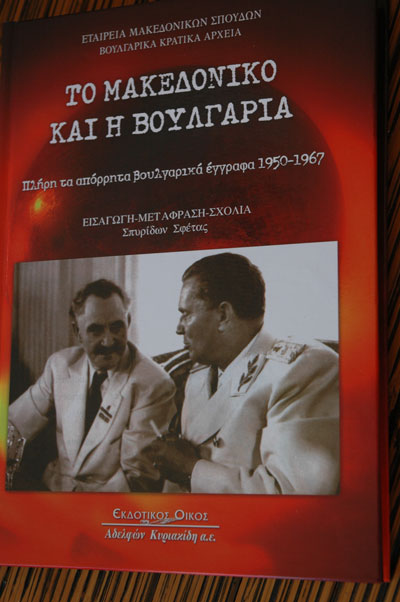
“The Macedonian problem and Bulgaria” is the title of the secret archives collection of the Bulgarian republic between the period of 1950 and 1967, which is dedicated to the political formation of the country in relation to Macedonia. The research of the book is a joint development of “Archives” agency of the Government of Bulgaria and the Center for Macedonian Researches in Thessaloniki. The book is published in Greek and soon, it will be published also in Bulgarian. The presentation was done personally by the Greek foreign minister Dora Bakoyanni in the presence of her father Konstantinos Mitsotakis, former Prime Minister of Greece and current honorable chairman of New Democracy.
21 documents – protocols from plenums of the Bulgarian Communist Party (BCP), reports, decisions of the managing directors of BCP, letters, declarations, and manifests – all dedicated to the Bulgarian politics in relation to Macedonia. All those become public for the first time and at that in Greek. “By going through the archives we concluded that Bulgarian politics in relation to the Macedonian problem has formed depending on the relationship tides between Belgrade and Moscow. When the relationship was good, Bulgaria was forced to sacrifice its national interests, to force its own citizens to call themselves Macedonian. On the other hand, when the relationship between Tito and Stalin was cooler, Sofia gains self-confidence to defend its national interests,” comments Spiridon Sfetas, who has been researching the Bulgarian archives and has been translating them in Greek.
This “tides” type of politics continued until the moment when Todor Zhivkov comes to the Bulgarian political scene. Spiridon Sfetas describes Zhivkov as an “uneducated but extremely smart villager.” It was Zhivkov who was the first one to understand that Bulgarian politics in relation to the Macedonian country should not be influenced by the relationship between Yugoslavia and the USSR. In his report in front of the BCP plenum on March 11 and 12, 1963, he outlines the principals, which Bulgaria needs to defend when it comes down to Skopje:
- The Macedonian country exists and this is a fact.
- As a historic community, the Macedonian nation never existed.
- We cannot agree that there is a Macedonian minority in Bulgaria.

“This is why Bulgaria was the first country in the world to recognize the Republic of Macedonia with its constitutional name but even until today, it does not recognize the existence of the Macedonian nation and minority on its territory,” concludes Spiridon Sfetas. “When we read those valuable documents, we can understand that today, Greece is facing the same problems with the Former Yugoslavian Republic of Macedonia as the Bulgarian communist government was 50 years ago.” This was the conclusion of Nikolaos Merzos – president of the board of directors of the Institute for Macedonian Research in Thessaloniki.
He reminded that Bulgaria and Greece have been fighting each other for centuries about Macedonia, they have spilled a lot of blood, there were battles and arguments and none of the countries is a saint. “When it comes to Macedonia, we can rarely agree on a solution. But the fact that historians from the Bulgarian National Archives and researchers from the Institute for Macedonian Research in Thessaloniki sat down together to study their histories, is an exceptionally positive example. This is a message to all Balkan nations for an honest and open dialogue in the name of a better future for all of us,” stressed Nikolaos Merzos. The Greek foreign minister Dora Bakoyanni also spoke about the importance of the publication as an example that Bulgaria and Greece have left behind the concepts and problems from the past and will cooperate in any field as partners in the European Union and NATO.
On the presentation of the book, again she outlined the Greek standpoint regarding the negotiations about the name of Macedonia. Those negotiations have been going on for 15 years under the aegis of the UN and with the mediation of Mathew Nimitz and the main Greek position are that the Macedonian name should be made out of a geographical definition, without any territorial claims and without a claim for a Macedonian minority in Greece. “this book is a result of the first cooperation between the Bulgarian National Archives and Greece. The topic is extremely important and current for the Greek researchers,” said Boryana Boujashka – director of the “Archives” agency. She announced that she has allowed the Greek historians to study the Bulgarian secret archives in relation to the Macedonian problem in the period from 1967 until the collapse of the Yugoslavian Federation.
Upcoming is the presentation of the book “The Macedonian problem and Bulgaria” in Bulgarian.